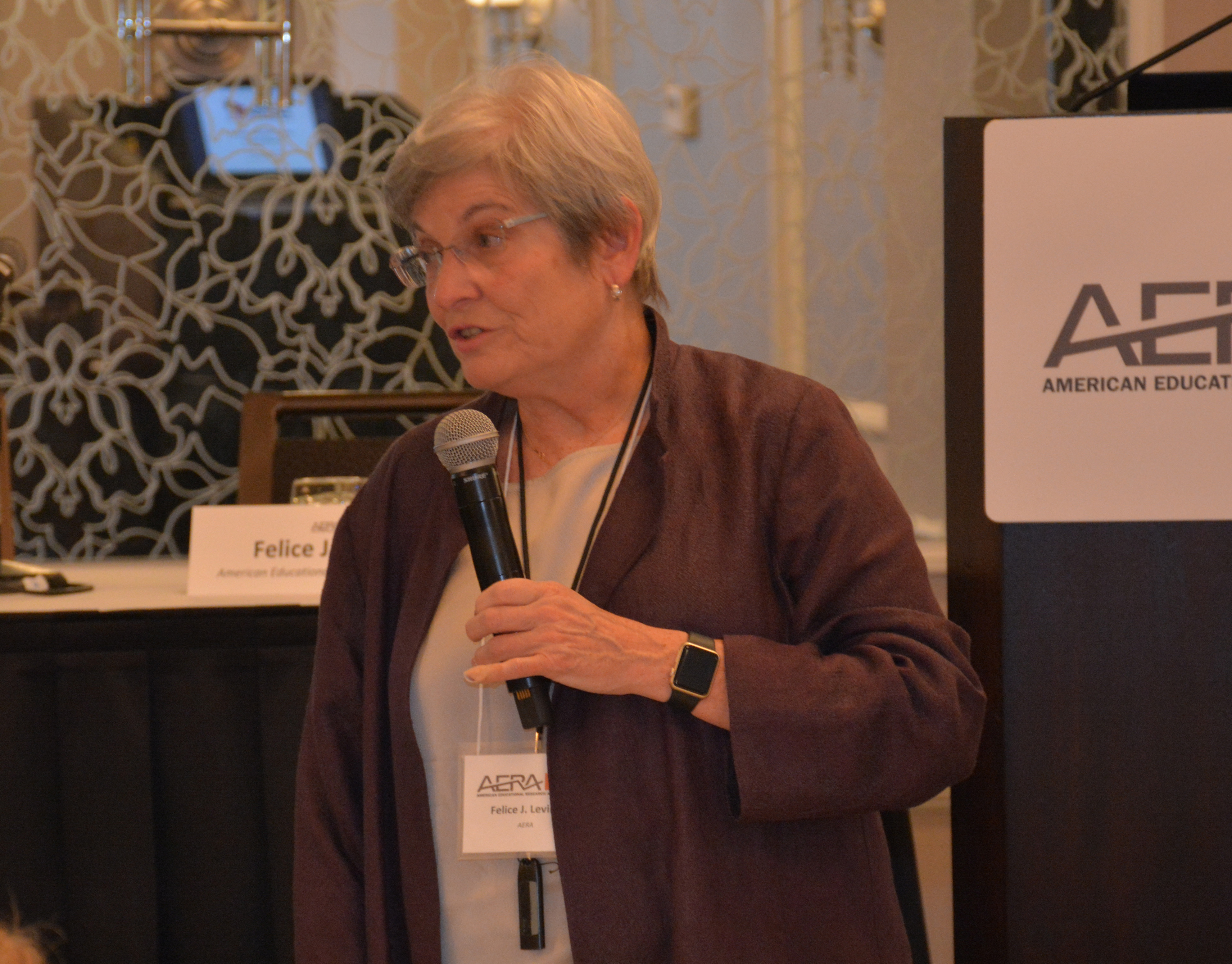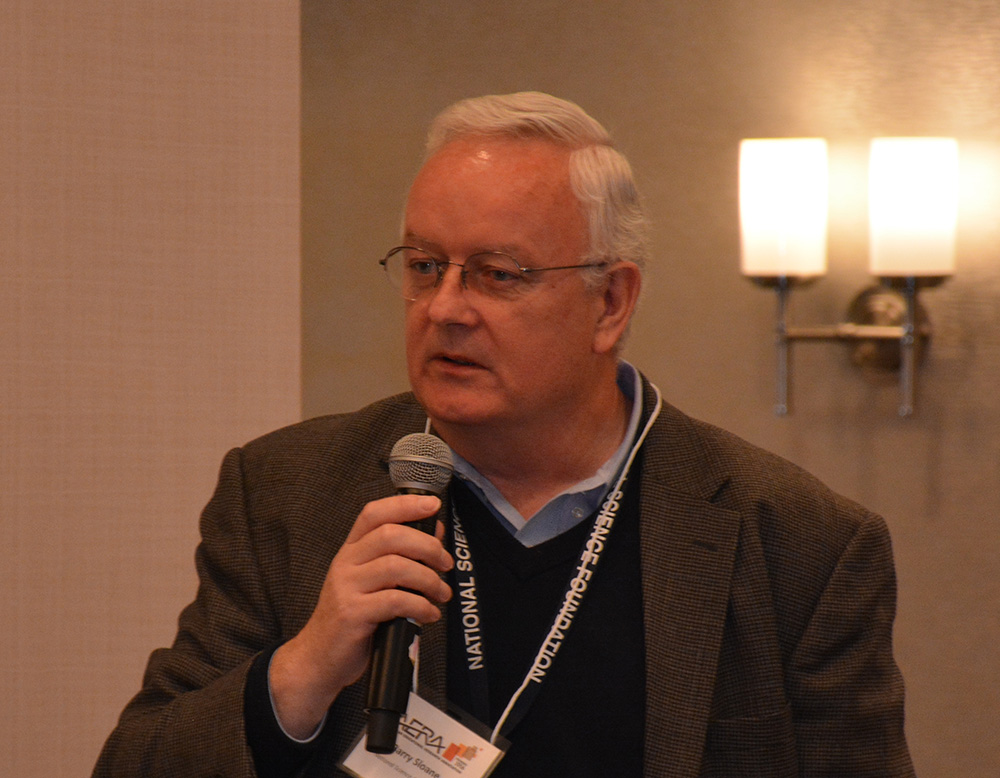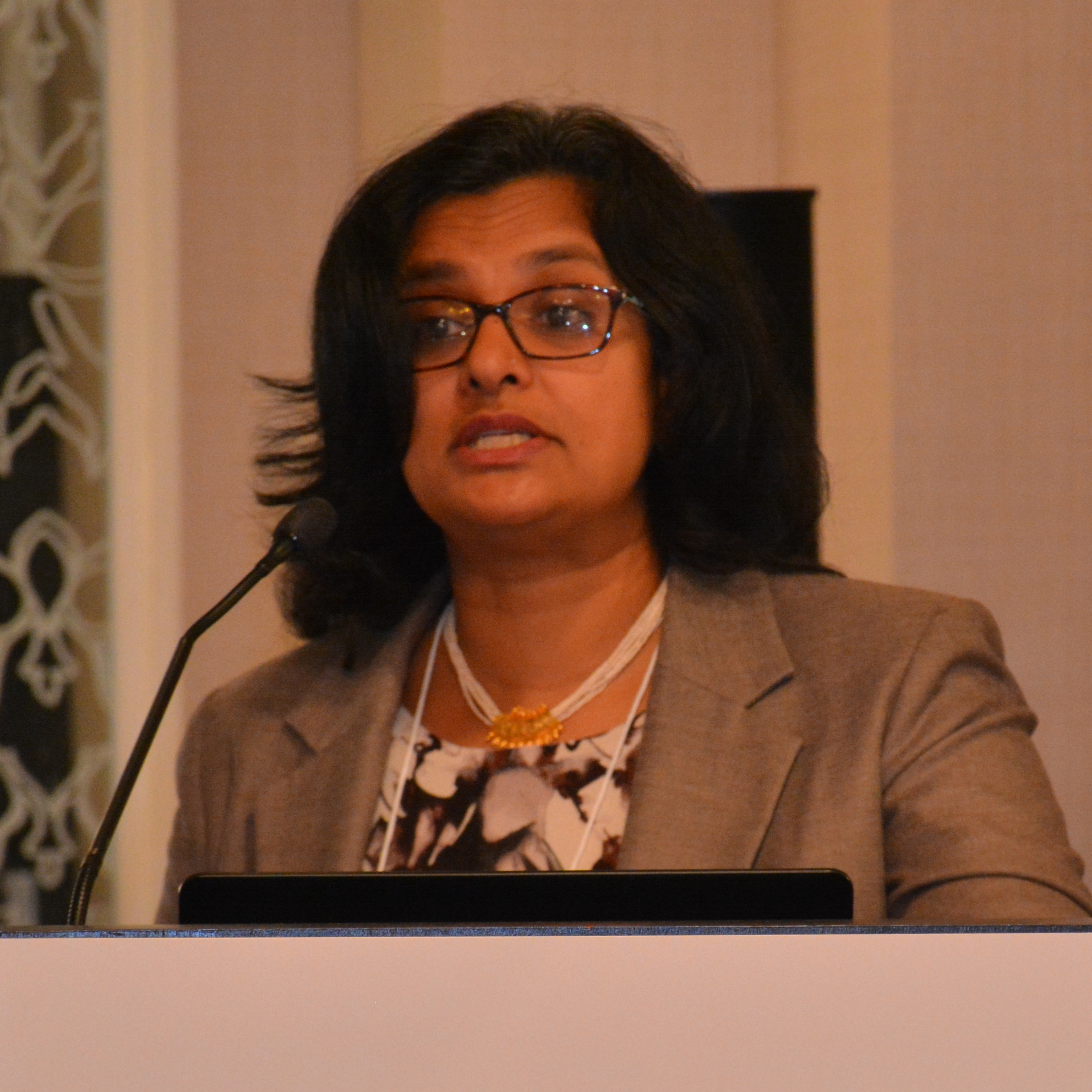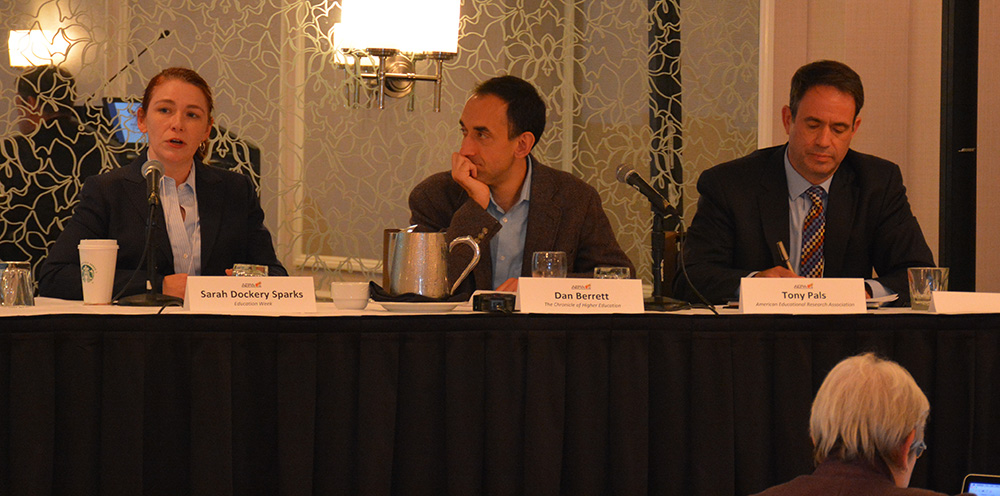
Felice J. Levine (AERA Executive Director)
|
November 2017
On November 1–3, the AERA Grants Program welcomed education research scientists and federal agency representatives to its Fall Research Conference. This invited conference featured advanced graduate students and early career scholars presenting research funded by the program.
The fall conference brought together the new cohort of dissertation awards; those who recently completed their dissertations; and new, early career research award recipients supported by the Grants Program. Scholars presented their completed dissertation research and discussed next steps for developing their research agendas. The AERA Grants Program operates under the aegis of a governing board of senior scholars who also participated in the conference.

Finbarr Sloane (National Science
Foundation) |
AERA Executive Director Felice J. Levine, who is principal investigator of the Grants Program, and Finbarr Sloane, program director in NSF’s Education & Human Resources Directorate, kicked off the conference and discussed how the program aligns with the NSF goals of emphasizing STEM research, supporting data use, and training the next generation of scholars and researchers.

Nimmi Kannankutty
(National Science Foundation) |
Nimmi Kannankutty, deputy division director of NSF’s Division of Graduate Education, discussed many of the data sources available to scholars wishing to use large-scale data to examine education research questions.
A key aspect of the conference was the data training and research concepts discussed throughout the sessions. Board members Larry V. Hedges (Northwestern University) and William H. Schmidt (Michigan State University) presented lectures on data replication and causal inference, respectively. Throughout the conference, grantees had opportunities to engage and network with the governing board members, federal agency representatives, and their peers.

Sarah Sparks (Education Week), Dan Berrett
(The Chronicle of Higher Education),
and Tony Pals (AERA) |
Beyond attention to substance and methods, the conference included a panel discussion on “How to Make Your Research Newsworthy” with Sarah Sparks from Education Week and Dan Berrett from The Chronicle of Higher Education. Moderated by AERA Communications Director Tony Pals, these journalists shared advice and guidance on how to work with the reporters and make research findings of interest to broader publics.
A hallmark of the AERA Grants Program is the professional development and training it provides to participants.
“The opportunity to build capacity for significant research along with networking opportunities distinguishes this program and attracts graduate students and early career researchers” said Barbara Schneider (Michigan State University), chair of the AERA Grants Program Governing Board.
With eight competitive awards from the National Science Foundation since 1990, the Grants Program is dedicated to the advanced quantitative analysis of large-scale, federally funded data sets to address education research topics such as mathematics education, classroom experiences, and other topics related to STEM learning and education.
The AERA Grants Program has funded over 500 graduate students and early career scholars since its inception. It has launched scholars and their research agendas, produced significant findings related to STEM education and learning, and contributed to fostering a culture of data use. Studies funded through this program use such data sets as the Early Childhood Longitudinal Study, High School Longitudinal Study, and other data resources developed by the National Center for Education Statistics and the National Science Foundation (NSF).
The table below lists the recently awarded AERA Grants Program Dissertation and Research Grant recipients and former grantees who participated in the conference
|
AERA Grants Program Dissertation and Research Grantees Funded Projects
|
|
Chris Curran
University of Maryland, Baltimore County
|
Early elementary science instruction: Estimating the impacts of instructional time, content, coverage, and pedagogy on equity in and achievement on science in kindergarten through second grade
|
|
Denisa Gandara
Southern Methodist University
|
The "promise" of free tuition and impacts on college enrollment: Differences across race and socioeconomic status
|
|
HyeJin Hwang
University of Michigan
|
Do knowledge and motivation matter? The role of prior knowledge and reading motivation in reading achievement in the elementary years
|
|
Eun Sook Kim
University of South Florida
|
Beyond testing measurement invariance in cross-national comparative studies with international education data: Investigating sources of heterogeneity
|
|
Scott Latham
University of Virginia
|
Kids today: The rise in children’s academic skills at kindergarten entry
|
|
Se Woong Lee
University of Wisconsin-Madison
|
Pulling back the curtain: The cumulative effects of having high-performing and qualified teachers on students’ educational outcomes
|
|
Hannah Miller
Brandeis University
|
Do boys benefit disproportionately from “good” schools? How gender disparities in achievement and attainment vary across U.S. high schools
|
|
Federick Ngo
University of Southern California
|
High school all over again: The problem of redundant college mathematics
|
|
Soojin Park
University of Wisconsin-Madison
|
Identification and sensitivity analysis for average causal mediation effects with time-varying treatments and mediators: Investigating the underlying mechanisms of kindergarten retention policy
|
|
David Quinn
University of Southern California
|
Trends in the seasonal dynamics of test score gaps by race/ethnicity and socioeconomic status: Evidence from the ECLS-K:99 and ECLS-K:2011
|
|
Emily Rauscher
University of Kansas Center for Research, Inc.
|
When does money matter? School funding and inequality of educational achievement
|
|
Deborah Reed
University of Iowa
|
PIAAC prison data analysis
|
|
Awilda Rodriguez
University of Michigan
|
Moving the needle: The roles of institutional quality, capacity, an student choice in college completion
|
|
Karina Salazar
The University of Arizona
|
Suburbios o Barrios? Using data science to study off-campus recruiting by public research universities
|
|
Matthew Shirrell
The George Washington University
|
The effects of subgroup-specific accountability on teacher job assignments, turnover, and attrition
|
|
Adela Soliz
Harvard Graduate School of Education
|
College competition: The effect of for-profit colleges on the market for higher education
|
|
Justina Judy Spicer
Michigan State University
|
Measuring student engagement in science classrooms: An investigation of the contextual factors and longitudinal outcomes
|
|
Dan Su
University of Wisconsin, Madison
|
Planned missing data designs in large-scale assessments: Design and imputation
|
|
Kendra Taylor
The Pennsylvania State University
|
Racial and income segregation at multiple geographic scales in large U.S. school districts
|
|
Dana Thomson
Boston College
|
Changing circumstances, changing outcomes? Longitudinal relations between family income, cumulative risk exposure, and child outcomes
|
|
Jennifer Timmer
University of Illinois, Urbana-Champaign
|
Improving math and reading outcomes for English learners
|
|
James Dean Ward
University of Southern California
|
Does financial dependency impact the effectiveness of performance-based funding policies? Considerations for equity, policy design, and heterogeneous policy effects
|
|
Adrienne Woods
University of Michigan
|
Who is placed in special education? Assessing the longitudinal profiles and academic achievement of students at-risk for special education identification
|
AERA Grants Program grantees will present their research in a poster session during the 2018 Annual Meeting. For more information about the Grants Program visit the AERA website.
Related story: